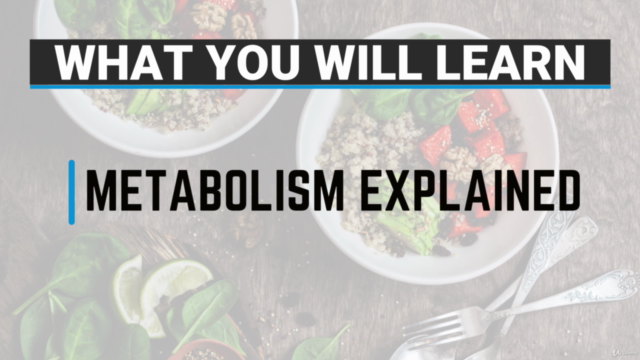Nutrition Certification: Advanced Diet & Meal Planning

Why take this course?
Ít seems you've outlined a comprehensive nutrition program that covers a wide range of topics from basic dietary principles to advanced strategies for fat loss, muscle growth, and even addressing specific health concerns. The program appears to be rich in content, offering detailed guides, meal plans, and resources that can be used across different dietary needs, such as vegan options.
Here's a brief summary of what the program encompasses:
-
Calorie Intake: Helps you determine how many calories you need based on your goals, whether it's fat loss or muscle gain.
-
Macronutrient Distribution: Guides you on how to balance protein, carbohydrates, and fats in your diet for optimal performance and health.
-
Timing of Meals: Provides insights into the best times to eat certain foods, particularly before and after workouts.
-
Diet Phases: Explains the different phases you may encounter in a fat loss or muscle gain diet, including how to implement diet breaks effectively.
-
Supplements: Offers science-based strategies for using supplements to reduce hunger and enhance your diet's effectiveness.
-
Bulk Types: Different types of bulking (dirty bulk, regular bulk, lean bulk) with step-by-step guides on how to execute each one.
-
Carb Cycling: Discusses the pros and cons of high carb vs low carb diets, as well as how to implement carb cycling.
-
Special Diets: Addresses popular diets like the HCG diet and the Blood Type diet, offering explanations and guidance.
-
Health Considerations: Provides dietary recommendations to prevent or manage conditions such as acid reflux, constipation, diabetes, and leaky gut syndrome.
-
Bonus Resources: Comes with a Nutrition Theory Guide, printable course slides, various meal plans (including a six-pack meal plan), pre- and post-workout meal suggestions, recommended supplements, and more.
This program seems to be designed for individuals who are serious about optimizing their nutrition for performance, health, and aesthetics. It's also tailored for those looking to understand the science behind food choices and how they can best support their fitness goals. With over 60 lessons on dieting and nutrition, it's a comprehensive resource for anyone looking to enhance their knowledge and practices in this area.
If you're considering enrolling in such a program, ensure that the advice aligns with your individual health status and consult with a healthcare professional if necessary. It's important to personalize any diet or nutrition plan to fit your unique needs and goals.
Course Gallery




Loading charts...
Comidoc Review
Our Verdict
The Nutrition Certification: Advanced Diet & Meal Planning course is a well-rounded, thorough program offering comprehensive insights into popular and trending diets. It emphasizes the importance of understanding the science behind meal planning and nutrition strategies while delivering content in an accessible, concise manner. The course caters not only to beginners but also fitness enthusiasts looking for advanced knowledge to fine-tune their expertise. While requests were made by users for additional resources and specific advice related to women's metabolism and hormonal differences, the overall learning experience provides a solid foundation in building successful diet plans tailored for various health and fitness objectives.
What We Liked
- Broad coverage of diet programs, including Keto, vegetarian diets, and more with a focus on the science behind them
- CPD accredited certificate adding credibility to your expertise in advanced nutrition and meal planning
- Concise and practical content tailored for various fitness goals, debunking common diet myths using a science-based approach
Potential Drawbacks
- Lacks specialized advice on women's metabolism and hormonal differences when it comes to bulking and cutting
- Limited visual representation of diets making understanding certain concepts challenging for some users
- Requests for providing source links or further reading resources that would support evidence-based studies